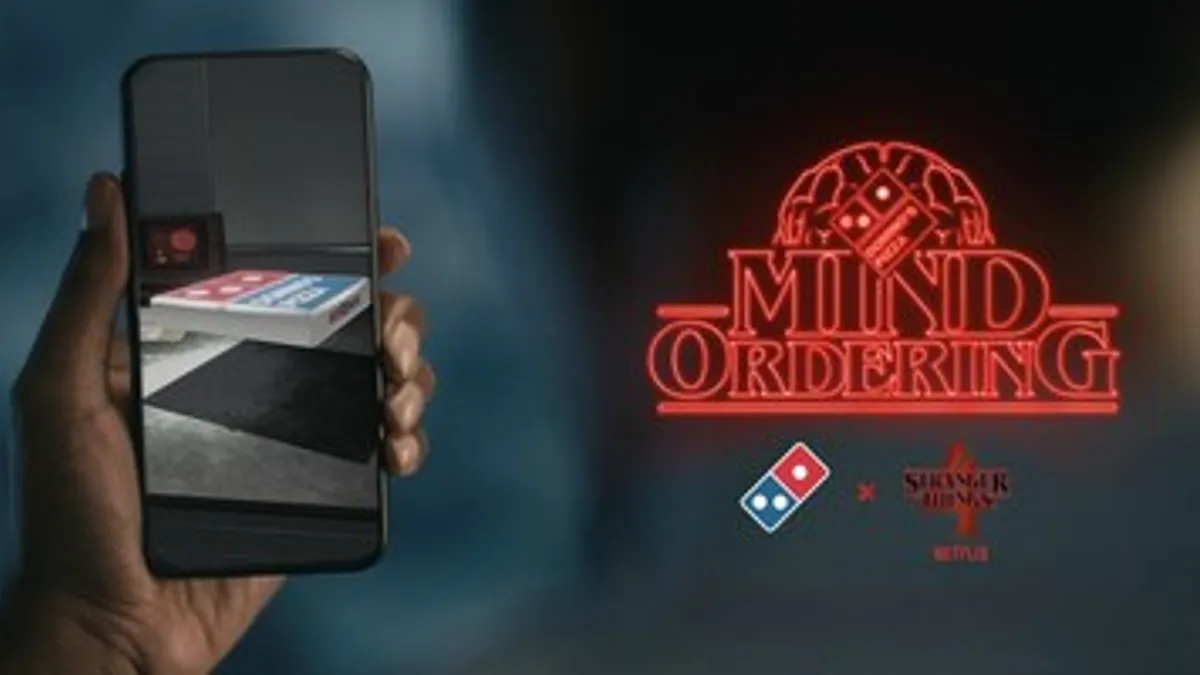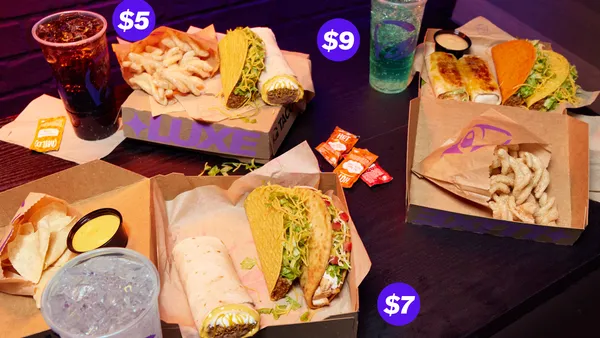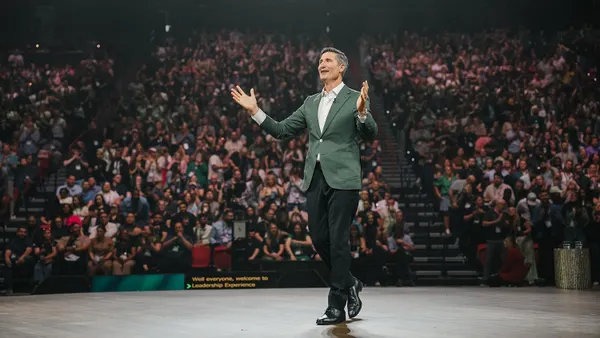UPDATE: May 17, 2022: Domino’s mind-ordering app does not use facial recognition and eye-tracking tech that captures personally identifiable information on the user, a spokesperson said in an email after publication. The tech locates the “facial plane” in 3D space to calculate movements, but none of that data is stored in Domino’s system.
Dive Brief:
- Domino’s developed a “mind-ordering” app as part of a promotion for season four of Netflix’s “Stranger Things,” the first part of which hits the streaming service May 27, per a news release.
- Available on the Apple App Store and Google Play, the app puts users in the shoes of a test subject at the Hawkins National Laboratory from the science-fiction series set in the 1980s. There, they can explore a virtual version of the secretive government facility, uncover Easter eggs and use their “powers” in conjunction with the brand’s Easy Order function.
- Billed as the first mobile ordering app of its kind, the platform applies facial recognition and eye-tracking features to let consumers complete their orders by making certain expressions and head movements. The concept lets Domino’s experiment with nascent technology that could be more meaningful to its business as mobile and digital ordering continue to gain popularity, while providing “Stranger Things” fans with a fun distraction related to the show’s supernatural mythos.
Dive Insight:
Domino’s is letting “Stranger Things” viewers role play as super-powered test subjects from the streaming series through its new app. Users are also potentially serving as real-world guinea pigs for the pizza chain as it tests out applications of facial recognition and eye-tracking — controversial pieces of technology that brands are nevertheless interested in as they try to build more robust consumer profiles and better measure factors like sentiment. Consumers are free to explore the app even if they don’t want to place an order, Domino’s said.
To promote the “mind-ordering” capability, Domino’s released a video where “Stranger Things” mainstays Dustin (Gaten Matarazzo) and Lucas (Caleb McLaughlin) bike to a Hawkins, Indiana, store location while trading friendly potshots. At the era-appropriate Domino’s, a power outage is followed by an order being mysteriously placed, tipping Dustin and Lucas off to supernatural goings-on. Eleven, a member of their friend group, was a product of the Hawkins National Lab and wields similar psychic and telekinetic abilities.
Additional marketing materials for the campaign include a limited run of ‘80s-themed pizza boxes for medium and large pizzas, excluding handmade pan pizza orders. Domino’s has also sprinkled the mind-ordering app experience with references to both “Stranger Things,” with nods to the show’s Demogorgon monster, and its own history. A website requests that users report any spottings of the Noid to the Hawkins Police Department. The Noid was first introduced as an antagonistic brand mascot in the ‘80s and was brought back into Domino’s marketing rotation last year.
Brand ties-in with “Stranger Things,” a crown jewel of Netflix’s original content slate, are kicking into high gear as the series returns from a three-year hiatus. While Netflix doesn’t run ads — a policy that’s expected to change soon — companies have still latched onto the program for product integration opportunities that tap into the show’s rosy depiction of ‘80s culture in small-town America.
Doritos last week revealed it would host a virtual music festival with several acts that hit it big in the decade, such as The Go-Go’s, Soft Cell and Corey Hart. The event on June 23 takes place in the Upside Down — a nefarious alternate reality where the monstrous Demogorgons linger — and tickets can be accessed through specially marked packages of the Frito-Lay chips.
For Domino’s, the mind-ordering concept arrives as the company comes down from earlier highs in the pandemic, when people ordered in more frequently. Same-store sales, a key measure of restaurant health, dropped 3.6% year on year in the first quarter. Domino’s is currently contending with sharp inflationary pressures and labor shortages, which have pushed it to rely more on carry-out promotions.













